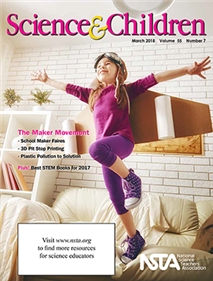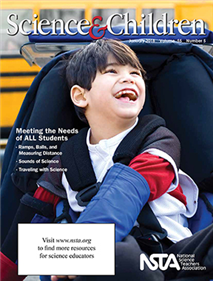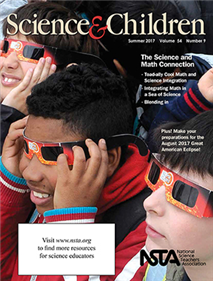All Crosscutting Concepts resources
Journal Article
Teaching Teachers: Designing an NGSS Learning Pathway
This column enhances the repertoire of preservice and inservice teachers. How informal institutions can help teachers implement the NGSS...
Blog Post
Seeds of Science, Roots of Reading Program Helps Students Develop Explanations
The Next Generation Science Standards (NGSS) encourage three-dimensional thinking in students. 3-D thinking, and the process of developing scientific explanations, are curiosity-driven: They involve wondering, posing questions, and making observation...
By Jim McDonald
Blog Post
How Teachers Are Retooling Lessons Using the EQuIP Rubric
Sometimes finding the right book or article can be the key to opening our minds to new ideas. A few years back, NSTA published a special journal series on the NGSS, and I recently re-read a few of them. Three in particular highlighted teachers’ exp...
By
Journal Article
Methods and Strategies: Teaching the Nature of Science to Elementary Students
This column provides ideas and techniques to enhance your science teaching. This month’s issue shares activities so that elementary students can learn about Nature of Science. When effectively integrated into inquiry investigations through proper s...
Blog Post
The Engineering Design Process: A Middle School Approach
To support the Next Generation Science Standards (NGSS) Middle School Engineering Design, we have three goals for our students: to define problems accurately, design the best solution using a rigorous process, and evaluate and improve their designs b...
By Cindy Workosky
Blog Post
Gravitational Interactions and 3-D Learning in Middle School
I recently embarked on a journey with K–8 teachers in Vermont to learn how to be intentional about planning for three-dimensional (3-D) learning in the classroom....
By Cindy Workosky
Blog Post
How NGSS and CCSS for ELA/Literacy Address Argument
In the summer of 2015, I observed an elementary science teacher from an NGSS-adopted state who made a presentation to her cohort of close to 100 K–12 science teacher leaders and administrators from schools, districts, and the state. After presentin...
By Cindy Workosky
Blog Post
Using Claim, Evidence, and Reasoning (CER) Strategy to Improve Student Learning
This past school year, I used claim, evidence, reasoning (CER) statements to show three-dimensional learning in my classroom. Several tools are available for doing this, but the one my students like is the CER Graphic Organizer and Transition Words L...
By Cindy Workosky
Blog Post
You Teach What? I’m So Sorry! Building a Better Body and Building Better Argumentation
I am always amazed at the looks on people’s faces when I tell them I teach middle school. They seem to pity me for having a position I chose and love! They inform me that middle school “tween-agers” are argumentative, stubborn, and at times, ad...
By Cindy Workosky
Journal Article
The Early Years: Taking Math Outside
This column discusses resources and science topics related to students in grades preK to 2. This month’s issue uses children’s interest in collecting outdoor objects to develop their number sense and to build their understanding of math concepts...
Blog Post
When I began aligning my instruction to the Next Generation Science Standards (NGSS), I got lost in the details. But when I realized that phenomena could be used to anchor linked disciplinary core ideas, I started to visualize the course as a whole a...
By Cindy Workosky
Blog Post
Using the Crosscutting Concepts to Scaffold Student Thinking
At the recent NSTA National Conference in Los Angeles, three-dimensional learning was, of course, a major topic of discussion. When those discussions focus on classroom instruction, though, the crosscutting concepts are often the forgotten dimension....
By Cindy Workosky





